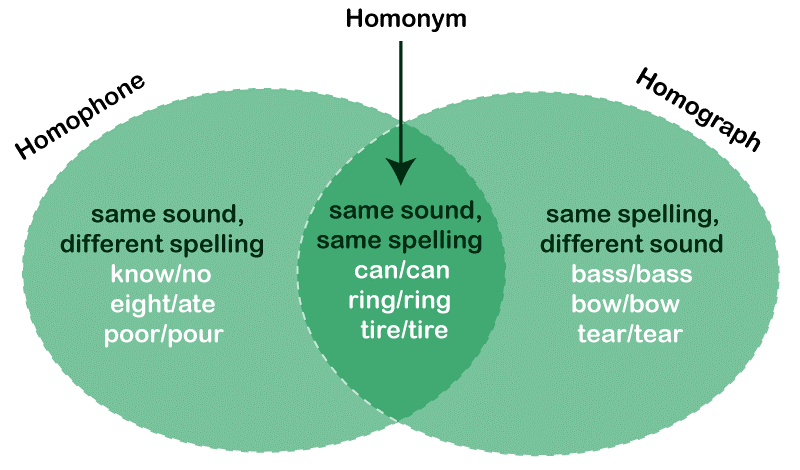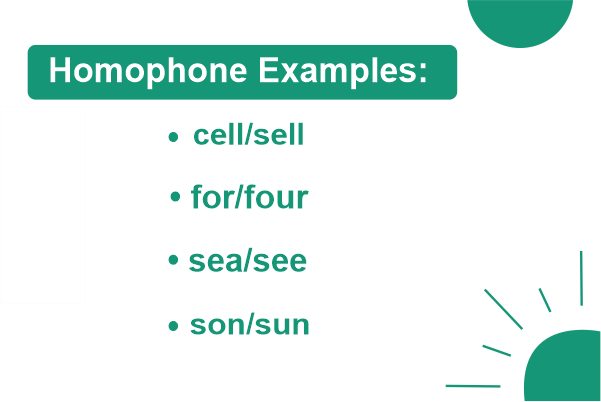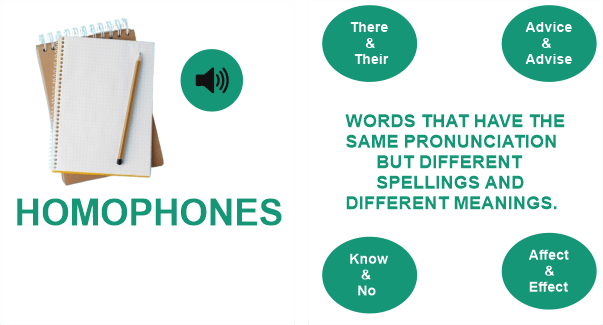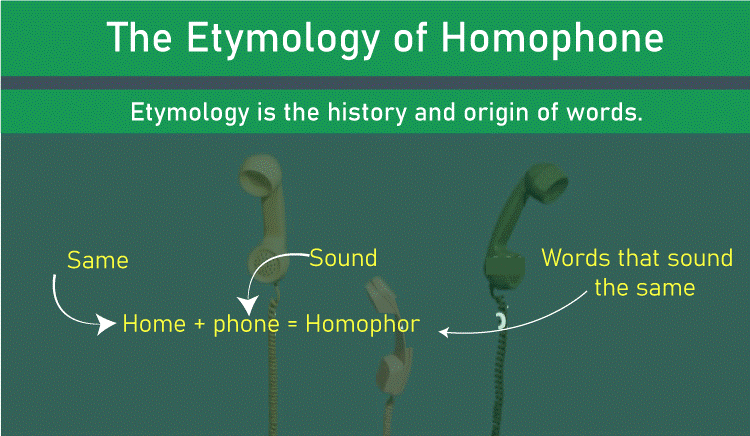HomophonesHomophones are terms that sound the same but have distinct meanings. Sometimes they are spelled the same way, and sometimes they're not. 
Homophones can be hard when studying a new language. They can even be perplexing if you are a native speaker of a language, specifically when writing. Continue reading to find out more about homophones, commonly mistaken homophones, and how to become a homophone expert. Types Of HomophonesAll homophones differ from one another. Homonyms are words that sound similar but are spelled differently, as well as have distinct meanings. For instance, "knead" and "need" are both homonyms and homophones. Homophones are further subdivided into homographs and heterographs. HomographsHomographs are terms that have the same spelling but may be pronounced distinctively and have various meanings. "Hail," as in "I'll hail a cab," and "hail," as in "I got caught up in the hail," are both homographs, as is "bow," as in "I'll wrap the fabric in a bow" and "bow" as in "Taking a bow before you perform on stage." HeterographsThese are terms that have distinct spellings and meanings but are spoken the same way. "Flower" and "flour" are both heterographs. 
HeteronymsThese are terms that have the same spelling but are spoken differently, as well as have distinctive meanings. "Tear," as in "she had a tear in her eye," and "tear," as in "you may tear up the page," are two examples. OronymsFollowing that are oronyms, a type of phrase that is frequently lumped in with homophones. Oronyms, just like the homophones, sound the exact same but have various meanings?and they do not often sound similar. "ice cream" and "I scream"; four candles and fork handles are two oronyms. Pseudo-homophonesThese are another type of word. These are two words that sound the same, but one of them is not an accepted word. Groan and grone are two pseudo-homophones ("grone" is an old version of "groan"). Pseudo-homophones are much more obscure, as they are often utilized in lexical judgment tasks during psychological and psycholinguistic studies to test how fast a respondent recognizes a word. SynophonesThese are terms that sound almost identical but have diverse meanings. Assure, ensure, and insure, for instance, are all synophones. 
Commonly Misunderstood HomophonesSince they sound so similar, it's simple to mix up homophones and use the erroneous one in your work. Here are a few instances of homophones that create confusing homophones in the English Language. Then/ThanThen/than is an adverb that describes in which something fits in a chain of events :
Than is a conjunction or preposition where two things are compared and contrasted :
To/Too/TwoTo, too, and two are three frequently misunderstood English homophones. To is a preposition, infinitive marker, or adverb that implies movement or the infinitive form of a verb ;
Too is an adverb that can mean something is excess or that something is occurring in addition to another event.
Two is the middle number in between one and three :
There/Their/They'reThere are three more frequently misunderstood English homophones: there, their, and they're. There refers to the adverb which describes a place or position.
Their implies the possessive pronoun.
They're is an abbreviation for "they" and "are" :
Your/You'reYour implies to the possessive pronoun.
You're is an abbreviation for the terms you and are :

Why Are There Homophones in Languages?There are numerous reasons why dialects have homophones. Some dialects have much fewer phonetic syllables in comparison to others, and this constrained syllable set nearly always results in homophones. Chinese is one such linguistic family, and with the emphasis on context in Chinese dialects, homophones play a significant part in communicating effectively. In other language families, such as English, homophones are caused mostly by changes in word phonetics over time. All languages change as people migrate, interact with other cultures, develop new technologies and meet new demands, and incorporate new languages into their own. Languages also evolve into unique regional dialects, and words that are homophones for one dialect may not be homophones for the other. The words "marry," "merry," and "Mary" are examples of this in American English. These three nouns have different pronunciations in different locations in the United States. Many of today's homophones were not originally homophones. Knight and night are two examples of English homophones that were originally pronounced distinctively. The term "knight" was spelled "cniht" in archaic English and was connected to the Dutch term "knecht," each of which pronounces the letter "k" at the start of the word. "Night" came from the archaic English words "neaht" and "niht." After the Norman Invasion and the English language's departure from its German roots, the distinct "k" sound began to fade, providing us with a silent alphabet at the start of the word "knight." Other terms, such as "knot," "knife," and "knit," arose in a similar way when English transitioned from a purely German language to one with considerable Latin elements. 
How Do Homophones Work?There are homophones in almost every language. The way they function and their cultural importance differ from language to language. Homophones are an important aspect of puns and other forms of wordplay in several languages. Here's an illustration: What do you name a chunk of wood that serves no purpose? Board. Get it? The wood piece is a board, and it is bored as it has nothing to do. The joke isn't as humorous as written down, but it does elicit a moan when uttered aloud. The same element that makes it entertaining is what makes it and related jokes challenging for novice language learners: the homophone. Aside from making it difficult to understand comedy, homophones can make it challenging for multilingual speakers to understand nuance while speaking, hearing, and writing. If you're speaking or reading in a new language and a word sounds out of place, it could be a homophone. Request clarification from the speaker or sender, or look it up yourself. Learning a new language's homophones can be a time-consuming and challenging process, but it's a necessary step toward full proficiency. Uses And Advantages Of Learning And Mastering HomophonesSome of the most popular homophones also happen to be some of the most prevalent grammar errors in the English language. Homophones can be perplexing at first for ESL students. However, understanding how to use them correctly will benefit you in the following ways :
Examples Of Homophones In A SentenceWe've defined numerous homophones, each of which is spelled differently. However, seeing homophones in action is the greatest way to grasp them. Here are a few examples of homophone statements. Homophones in each sentence have been highlighted for your convenience.
Next TopicHomophones Examples
|
 For Videos Join Our Youtube Channel: Join Now
For Videos Join Our Youtube Channel: Join Now
Feedback
- Send your Feedback to [email protected]
Help Others, Please Share










